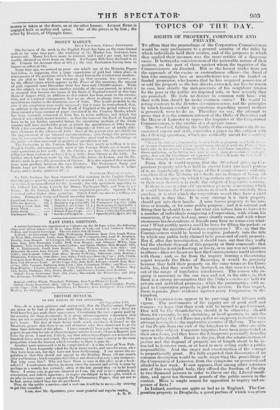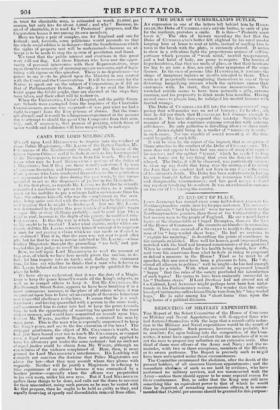TOPICS OF THE DAY.
RIGHTS OF PROPERTY, CORPORATE AND PRIVATE.
To affirm that the proceedings of the Corporation Commissioners would be only preliminary to a general scrutiny of the titles by which individuals held their estates, and of the purposes to which they applied their incomes, was the mere artifice of a desperate cause. It betrayed a consciousness of the untenable nature of their position, on the part of those against whom the inquiries of the Commissioners are directed. But as the honest trader fears not the approach of the excise or customhouse officer—the dread of him who smuggles lace or manufactures tea—so the landed or funded proprietor, who knows that he has acquired possession of or sold his property as the law directs, cares not, nor has he reason to care, how strictly the malepraetices of his neighbour trustee for the poor or the public are inquired into, or how severely they are punished. Ilfe feels no danger in common with him : why then with him should he make common cause ? He would be acting contrary to the dictates of common sense. and the principles by which human conduct in questions regarding money matters is governed, were he do so. Therefore we say, the attempt to prove that it is the common interest ot' the Duke of BEnyouo and the Mayor of Leicester to oppose the inquiries of the Corporation Commissioners, is the artifice of a desperate ett112e.
The Standard, liff.liting the battle of the eorpomtors with its ac- customed vigour and skill, concludes a paper on this subject With the following questions, which are evidently meant for n scttli;ig argument-- " is not tle, title of a Cort”tration to sn li Linds Or ',Portly ;t, it 1,,,14. 1;.1.
at its own aIisrretiun, told tot in special I t•tet, identical with the Pit!,.••
find's title to his ? Consequently, it. ;hie Legislature intet fere, eitlter
direct spoliation, or by lettiug in it joint -re tam:y upon possession (•t ;, h pre.
perty, does not the LegisLiture set a precedent that will make the tit . I., th • Woburn virtually not worth one farthing f From this it would appear, that the Standant gives up Cor- poration property held in special t rust (no small portioa of it, we apprehend) to the fangs of the (7ientnissimnirs ; and only considers that the Woburn I itie-deeds are in danger of being set aside, when the property which Coeporations are empowered to tisk... at their own di,;ercti-n is made the subject of legislative scrutiny.
If there is one rition (d' Corporation property concerning which it would become the Commissioners to search more carefully than owner, it is that which the eorporators assert they have a right
to do with as they like. It is very strange w such property should get into their hauds. A man leaves property to his rela- tives or friends, or for some public purpose ; and it is natural and fitting that he should do so: but what can induce him to leave it to a number of individuals composing a Corporation, with whom his connexion, if he ever had any, must shortly cease, and with whose successors his descendants or friends may have no connexion what- ever ? What earthly motive could he have for filling the pockets or pampering the appetites of unborn corporators ? We say that the Commissioners would be bound to inquire jealously into the title by which any public body claimed to be possessed of such property. But if, after due investigation, it should turn out that they really had the absolute disposal of this property at their command—that they could lay it out in feasting, or finery, or in any way not injurious to others—then we do not see how the Commissioners could interfere with them : and, so far from the inquiry bearing a threatening aspect towards the Duke of BEnroftn, it would be precisely because they hold their property on the same terms as his Grace holds his, that they would be declared, on this occasion at least, out of the range of legislative interference. The reason why in- quiry is necessary in the one case and not in the other, is, that there is a strong presumption that the Duke's estates art` held for private and individual purposes ; while the presumptiomm with re- gard to Corporation property is just the reverse. In this respect, there is prima fade evidence against every Corporation in the kingdom.
The Commissiu.ners appear to be pursuing their labours with vigour. Time instruments of the inquiry- are of good stuff and temper: we hope that their work will be turned to good account. Dire will be the dissatisfaction should it be otherwise— should there, for example, be any shrinking at heath-quarters, to suit time tortuous policy- of Lord BROCGIT AM (let BS suppose), in another vain attempt to conciliate the implacable enemies of Reform. The eyes of the People from one end of the kingdom to the other are wide open on this subject. Corporate iniquities have been perpetrated at their own doors, and they know the delinquents personally from the mayor to the tipstaft. Great is the ,joy, that the administration of justice and the disposal of property are at length about to be in- trusted to honester men, or at least to men acting under a public responsibility. And the anger and consternation of the corrupt is proportionally great. We fully expected that discoveries of no common description would be made respecting the proceedings the Corporation of Leicester, from the symptoms we perceived and alluded to last week. It now appears, that among other notorious acts of this worshipful body, they offered the freedom of the city to two thousand persons in order to throw out the Liberal candi- date, and spent ten thousand pounds of the public money in the contest. Here is ample reason for opposition to inquiry and ex- posure of facts
In Ireland, matters are quite as bad as in England. The Cor- poration property in Drogheda, a great portion of which was given in trust for charitable uses, is estimated as worth 25,0001. per annum, but only lets for about 3,0001.; and why ? Because, in- stead of charitable, it is used for " Protestant " purposes, and the Corporation leases it out among its own members. Here we have a pair of samples, one for England and one for Ireland : and, forsooth, some politicians would persuade us that the whole social edifice is in danger—that the foundations on which the rights of property rest will be undermined—because an at- tempt is to be made to stop the system of peculation and fraud.
We trust that the public interest and exertions in this great work will not flag. Let those Electors who have now the oppor- tunity of personal intercourse with their Representatives, urge -upon them the necessity of spurning meagre measures, and of legis- lating tie ith vigour on this question. There is no dependence—we grieve to say it—to be placed upon the Ministry in any contest with the Court and the Conservatives. It will be necessary for the Nation to speak out on the subject of Corporations, as it did on that of Parliamentary Reform. Already, if we read the Minis- terial paper the Globe aright, they are alarmed at the steps they have taken, and their efibrt will be to draw in. When the Universities, Christ's Hospital, and the public Gram- mar Schools were exempted from the inquiries of the Charitable Commissioners, no one was surprised—it was just what we had a right to expect from the Tory Fawns of abuses. But the times are altered; and it would be a dangerous experiment at the present day to attempt to shield the great City Companies from that scru- tiny, and, if necessary, that process of purging, which those of antler wealth and influence will have unsparingly to undergo.



















 Previous page
Previous page